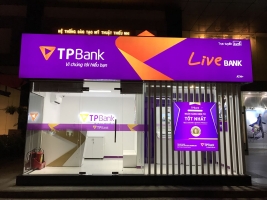Exclusive
BOCOM International's Hao Hong to be one of the panelists at the 2017 Banking Forum
He will join the discussion about banks and fintechs.
BOCOM International's Hao Hong to be one of the panelists at the 2017 Banking Forum
He will join the discussion about banks and fintechs.
Standard Chartered's Deniz Güven discusses going digital with a human touch: Why delivering high-tech services to clients is not enough
The bank's new global head for design and client experience wants to introduce humanised, easy-to-use solutions instead.
Asian Banking and Finance Awards 2017 recognises record number of winners
Over 180 trophies were awarded to winning banks and insurance companies.
Hang Seng Bank's John Wong to discuss the need to digitalise banks' operational needs
He will be one of the panelists at the 2017 Banking Forum in Hong Kong. John Wong, head of global liquidity and cash management at Hang Seng Bank, has over 28 years’ experience in transaction banking. He has responsibilities across sales, product management, digital banking channel development, and client implementation. Wong has a proven track record in delivering strong and sustainable business results and has thorough knowledge on the commercial banking sectors. He possesses strong leadership and good stakeholders management skills. He has a successful career span in business transformation and managing changes effectively with multi-cultural appreciation in working with people of different nationalities and background. He worked in Standard Chartered Bank for 25 years prior to moving to his current role in Hang Seng Bank. Wong will be one of the panelists who will discuss Digital Banking vs Physical Branches at the 2017 Banking Forum in Hong Kong. What are your previous experiences and positions held that contributed to who you are as a banker/financial services expert today? My diverse background from sales and marketing, product development, electronic channel innovation and client implementation and management help me to understand our customer needs from end to end. My experience in the Hong Kong and China markets also help me to appreciate the cultural differences of customers in different continents, and to come up with solutions that best serve their needs. What are your key business philosophies? To provide a solution which addresses customer needs, rather than product driven sales. To establish long term partnerships with mutual benefits to both the customer and the bank Can you give us a glimpse of what you will share at the panel discussion at the Banking Forum in Hong Kong? What can you say about the impact of digital banking on physical bank branches in Hong Kong and in the region? The role of the branch to change from servicing into advisory. Routine day to day operational needs to be moving into digital channel gradually.
Esmond Lee of Hong Kong's Financial Services Development Council to sit as a panelist at the 2017 Banking Forum
He says the cross border payments in the foreseeable future will still be served by banks.
Celent's Eiichiro Yanagawa to talk about a holistic framework for digital in banking
He will discuss the lack of consensus on digital at the 2017 Banking Forum in Hong Kong.
Learn more about Hong Kong's real-time payments market from Hang Seng Bank's Stéphan Levieux
He will be one of the panelists at the 2017 Banking Forum in Hong Kong.
Catch Simon Leung of China CITIC Bank International at the 2017 Banking Forum in Hong Kong
He will join the panel discussion on banks and fintechs.
Hear from EY's Keith Lin as he talks about fintechs and the digital banking landscape
He will also join the panel discussion on the impact of digital banking on physical bank branches at the 2017 Banking Forum.
ICBC Asia's COO to discuss how third party payment providers threaten traditional banks at the 2017 Banking Forum in Hong Kong
Jimmy Chan says real-time cross-border payment progresses in line with the international development of e-commerce. Jimmy Chan, chief operation officer and head of operation management department at ICBC (Asia), has over 30 years of experience in major international banks including The Chase Manhattan Bank, ABN-AMRO Bank, OCBC Bank, CITIC Industrial Bank (China), CITIC Bank International, DBS Bank, and ICBC (Asia) Ltd. He currently serves as a member of various committees at the Hong Kong Association of Banks: Consultative Council, Financial Services Delivery Channel Committee, and the Consultative Committee on Deposit Protection Scheme. He is also a member of the board of directors of the HKEX-OTC Clearing Limited. Chan will be one of the panelists who will discuss Real-time Cross-Border Payments in Asia at the upcoming Banking Forum 2017 in Hong Kong. Chan believes that the cross border real time payment is actually developed in line with the international e-commerce development. He says it was originated from the USA with gurus like eBay, Amazon. “When they sell products over the internet, a real time cross border payment mechanism has been evolving to satisfy the need for immediate clearance and settlement against product delivery. The application is further enhanced by the Chinese market and has since developed into even more powerful platform and much bigger market, like the Alipay from TaoBao and the Wechat Pay from Tencent. This development poses a threat to commercial bank which is the traditional provider of cross border remittance product. The Forum can discuss on the relationship between traditional banks and these third party payment providers, competition and cooperation,” he adds. The 2017 Banking Forum will be held on July 26 at the Conrad Hong Kong.
Bain & Company's Priscilla Dell'Orto to speak about customer loyalty and digitalisation trends in banking
She will be one of the speakers at the 2017 Banking Forum in Hong Kong on July 26. Priscilla Dell’Orto is a principal in Bain & Company’s Hong Kong office. She is also a leader in Bain’s global Financial Services and Customer Strategy & Marketing practices. She has deep experience with customer loyalty and the Net Promoter System (NPS) across a number of industries in Asia, with a focus on retail banking and insurance. She is actively involved in the development of Bain’s next generation NPS tools. Dell’Orto earned an MBA from NYU Stern School of Business. She is a graduate of Università Commerciale Luigi Bocconi, Milan, where she received her BA in International Economics and Management. Dell’Orto will be one of the speakers at the upcoming Banking Forum 2017 in Hong Kong. She will be talking about Loyalty in Banking in an Increasingly Digital World. Find out more about her in this short Q&A: What are your previous experiences and positions held that contributed to who you are as a banking expert today? As a Principal at Bain & Company I’ve primarily focused on the Financial Services industry. Over the past 8 years I have advised a number of Financial Services clients globally – including banks – helping them to address some of their toughest business challenges related to strategy, customer experience and loyalty, IT and digitalization, performance improvement, organisational redesign, and change management.
Mobile payments boom as banks, fintechs collaborate
Find out how DBS, Maybank, OCBC, and Bangkok Bank partner with fintechs to bring a better user experience in the payments space.
All you need to know about the newly launched FinTech Association of Hong Kong
It is led by 12 committees, each dedicated to a particular branch of FinTech. The FinTech Association of Hong Kong (FTAHK) was officially launched on June 27 in an event that was attended by over 300 guests from across the local FinTech community and other industries.
Why humans remain key in banking cybersecurity
Find out why industry experts put a premium on the human factor in today’s digital times.
It's boom time for Indonesian banks as economic growth remains promising
Despite stable market conditions, the country’s economy is not quite out of the woods.
Fintech startup Scale360 deploys teller-less branches in Vietnam
TPBank launched 12 digital branches in 1Q17.
How AI will dominate banking in Asia
Hillstone Networks, Latize, and Software AG Asia share why AI is the future of banking. Startup fintechs, e-commerce brands, and even established giants such as Google, Apple, Amazon, and Facebook are scrambling for their place in the money market, all driven by today’s rapidly evolving technology. This disruptive, game-breaking factor spoils consumers with convenience and intuitiveness in all facets of their life, and banks that fail to deliver just that will see their clients walking out the door. Fortunately, these alternative channels have not encroached that deeply into the traditional banking sector—yet. This gives banks a chance to step up their game, be more competitive, and hold their ground. Alan McIntyre, senior managing director and head of banking practice at Accenture, in their Banking Technology Vision 2017 report, explains, “The more goals a bank helps people achieve, the more confident people will be in the partnership, yielding an ever-stronger relationship with each interaction.” Reflecting the same sentiment is Anneliese Schulz, vice president of Software AG Asia. She says, “With the digital revolution changing the rules of banking, exceeding customer expectations is the key to growth and remaining competitive.” One way to achieve this is through trends such as artificial intelligence. Schulz explains this, saying, “Banks have to adopt a cohesive digital strategy by leveraging disruptive technologies such as AI to reimagine the customer experience and offer customers choices of where, when, and how they bank.” The AI experience “Elements of AI have been used in banking, finance, and insurance firms for quite some time now,” says Tim Liu, CTO of Hillstone Networks. “Backed by machine learning and big data, AI can automate tasks previously done by humans to help us make better, more informed decisions.” These machine learning systems will drive AI applications towards the ease of interaction customers are craving for. Better yet, the longer they run and the more they gain experience from data, the more effective they will be in addressing various banking situations, streamlining processes, and supporting customers. As it stands though, banks have only played on the fringes of AI’s full potential. Vikram Mengi, co-founder and CEO of Latize, says that it’s a huge missed opportunity. The data is there already, but “the problem with this is that the data is not necessarily in a form that can be easily utilised. However, by infusing the data with intelligence, one can transform all that data into a form that is easily usable.” Mengi sees the true success of AI in banking when these three aspects have been realised: a single knowledge base unifying all relevant diverse data sets; utilising knowledge representation models to interrogate known facts and infer unknown truths; and using abstraction layers through continuous application and learning from diverse data sets. “Banks have access to vast amounts of data and practical alignment of the above mentioned three aspects will result in value generation for banks and conversely the customers they’re serving,” he adds. In fact, 79% of banks surveyed in the Accenture report agree that AI will drastically improve their whole business and client relationships. Twenty-nine percent agree that it is critical for their products and services to be offered using centralised platforms, virtual assistants, and chatbots. Moreover, 76% foresee that most banks will have AI interfaces as their main customer touch points in the next three years, whilst a surprising 71% of them agree that AI can be the face of their business. To further emphasise how fast technology is evolving, it’s important to note that this AI-first mindset is quickly overtaking the relatively young mobile-first movement. Fitting into the puzzle “Moving forward, there are a number of areas in the industry where the implementation of AI can help streamline and improve processes,” says Liu. He notes areas like customer-facing functions and targeted marketing as two areas where AI can make an immediate, noticeable impact. Customer-facing functions involve the aforementioned robo-advisers, virtual assistants, and chatbots. In using AI applications for these services, “customer service can take a giant leap forward by eliminating the frustrating waiting time we are accustomed to,” says Liu. “Poor performance in this area is also a reason many internet banks have difficulty scaling up. Banks have adopted automated response systems for customer service and the system has improved over the years.” Besides being efficient time-wise, AI also frees customer service agents to focus more on complex situations where machines can’t match human empathy and intuition. Besides providing advice without human intervention, Schulz comments that the endeavor results in cost savings. “The key advantage of robo-advisers is that customers receive investment advice based on algorithm-based formula at a fraction of the cost of traditional financial advisors.” She adds, “Banks will see more automation and consolidation in asset management through the adoption of robo-advisors to improve customer experience. Eight in 10 consumers in Singapore would welcome robo-advisory services for their banking, insurance, and retirement planning according to a study by Accenture.” Banks can also implement AI to better bring customers the products and services that fit their needs. Liu says that after all, BFSIs do have the transactional and personal data necessary to determine the spending patterns and financial health of their clients. “Based on personal and demographic data, the system can identify opportunities and patterns previously unidentifiable by the human eye. This helps to better profile and therefore personalise marketing efforts to consumers, enabling prompt decision-making on marketing efforts to maximise impact and returns.” Schulz also points out that investments banks are researching how predictive analytics and machine learning can improve profitability through providing assisted decision-making in the sales and trading departments. “Banks are learning how to effectively use predictive analytics and machine learning to monetise customer data to create new capital from data sources and ultimately transform their business models,” she explains. In addition, Mengi says that AI can better secure the banking environment through anti-money laundering and anti-fraud measures. Going back to the amount of data banks have, they can “sift through it to spot irregularities and patterns that point to money laundering activity instead of just looking for anomaly and irregular pattern detection based on statistical methods.”


















 Advertise
Advertise


















